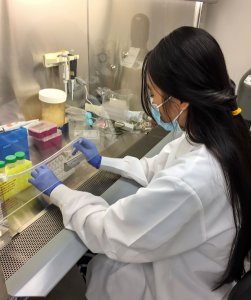Diagnosing Neurodegenerative Diseases
Ohio Wesleyan Senior Spends Summer Working in Lab at Washington University School of Medicine

Name: Hien Ngoc Mai ’22
Hometown: Ho Chi Minh City, Vietnam
Majors: Neuroscience (B.A.) and Biochemistry (B.S.)
OWU Connection Experience: Summer Research Program at the Mallinckrodt Institute of Radiology, part of the Washington University School of Medicine in St. Louis, Missouri
Hien Ngoc Mai ’22 is spending her summer working within the Precision Radio-Theranostics Translational Laboratories, part of the Mallinckrodt Institute of Radiology at the Washington University School of Medicine. Mai is working under the mentorship of Zhude Tu, Ph.D., a Washington University professor of radiology and the lab’s principal investigator.
The Research
“This project is focused on the development and validation of using positron emission tomography (PET) radiopharmaceuticals to quantify receptors, enzymes, and transporters in the nervous system,” Mai said, “with an aim to develop biomarkers with radioactive chains to diagnose neurodegenerative diseases.”
According to the lab: “These imaging agents are used for diagnosing early-stage neurological disorders and assessing disease progression, as well as monitoring the therapeutic efficacy of treatment for CNS (central nervous system) disorders including Alzheimer’s disease, Parkinson’s disease, Huntington’s disease, and schizophrenia.”
My Role
“My responsibilities are preparing and running immunohistochemistry, Western blot, and cell culture,” Mai said. “The experience consolidates what I learned in the classroom and my enthusiasm for neuroscience.”
What’s Next
When she returns to Ohio Wesleyan, Mai hopes to use an OWU Connection grant to study “Deletion subunit of NMDAR using CRISPR/Cas9” during spring semester.
For the research, Mai expects to use a naturally occurring gene-editing tool called CRISPR/Cas9 to explore synaptic plasticity (the ability of signals between neurons to strengthen or weaken over time).
Why I Chose Ohio Wesleyan
“The Neuroscience program and Computational Neuroscience track.”
My Future Plans
“I aspire to become a scientist, and I aspire to support young people. Following the doctorate, I would like to pursue a post-doctoral position, followed by (providing) mentorship for the young generation.”
